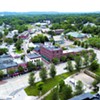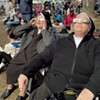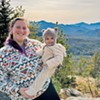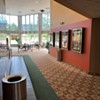Published July 2, 2003 at 4:00 a.m.
Driving up College Street just east of Union, you pass a modern, unmarked brick building. Its tall, narrow windows, separated by slender brick columns, suggest a cage. But it's immediately clear from the windows' pleasant glow that no one's being forced to stay inside. You're being kept out.
The building belongs to the Ethan Allen Club, one of several private social clubs in Burlington. If you ask why they're trying to keep you out, they'll say they're not. They're just careful about who they let in. It's no secret that the Queen City is home to nationally recognized organizations like the Elks, the VFW, the Odd Fellows and the Eagles. But it's possible to live next door to one of Burlington's local clubs and never know what the devil goes on in there.
Privacy is great and all, but I think the history and traditions of our private clubs should be public domain. We can learn a lot about this town by looking at why these clubs were founded, who belongs and why. Getting inside is not just about satisfying my curiosity... right?
Friday is Poker Night at the Samuel D. Champlain Club on Crowley Street in the Old North End. A wooden sign and a ship's wheel greet anyone who travels down this quiet, dead-end street to find the two-story gray building. A swing-dance class is meeting upstairs in the function room, but the downstairs lounge admits members only.
Trustee Tom Carr, who retired after 27 years with the Burlington Electric Department, has invited me to join the five men and women gathered around the card table. They all wear T-shirts and jeans -- except for Carr, who looks grandfatherly in his sport coat as he puffs on a curvy wooden pipe. Plaques and trophies line the walls, along with a print of a sailing ship, and a sign asserting, "Old age and treachery will overcome youth and skill."
Before joining the game, I order a Rolling Rock at the bar and check out the pool room. The club owns two tables where members can play "German Club Eight Ball" for 50 cents a game. A turn at the 23-foot shuffleboard table is free. On the far wall hangs a wooden emblem bearing the club's original name -- Goethe Lodge 592 Deutscher Orden der Harugari (German Order of Friendship and Humanity) and the year it was founded, 1892. The trustees changed the name in 1995, but people still call it "the German Club." For years, only German-speaking males of German descent could join, and they had to be 16 or older, capable of supporting a family and of "good moral character." German influence faded after World War II, and in the 1960s the club started admitting women.
Today its members have little in common other than an interest in boating and a fondness for the neighborhood clubhouse. Anyone can fill out an application; members vote on new initiates. Appli-cants have been refused in the past, but Carr claims that's extremely rare.
While I'm checking out the pool room, the dancers upstairs shake the ceiling, rattling the miniature Clydesdales inside the Budweiser King of Beers pool-table lamp. "Good thing you didn't come on a contra-dance night," someone shouts from the poker table. No one's complaining about the noise, though. The club's 55 members pay annual dues of $50, or $75 per couple, and the rent from the dances is more than welcome.
The volunteer-run club keeps overhead low. Members take turns cleaning the bathroom and running to Costco for supplies. Everyone's friendly during the card game, even though I accumulate a hefty pile of chips on a particularly lucky hand of "Anaconda."
Friday nights get a little rowdy at the St. John's Club, a squat brick building in the old working-class Lakeside neighborhood in Burlington's South End. Club member Bob Bolyard hosts karaoke, which is free and open to the public.
I'm too chicken to stand up and sing, especially before I've had anything to drink, so I order a dollar draft of Pabst Blue Ribbon. No one here has heard yet that PBR is trendy. The St. John's Club is not at all trendy, and therein lies its charm. The seats are vinyl, the tables Formica, the air smoky, the music loud. On weekdays the Blodgett employees from next door drop in for lunch. Club manager Gary Hathaway and cook Joey Cote prepare and serve a daily special. Tuesdays it's meatloaf; Wednesdays are three-dollar burger days.
Hathaway praises the club and its members with an enthusiasm that must come in handy in his part-time career as a pro-wrestling promoter. Besides overseeing meals and tending bar, he checks in on a member who has cancer, making sure he gets his Meals on Wheels every day. It's not uncommon for the club to hold fundraisers to help pay a sick member's medical expenses.
St. John's is named for the Union St. Jean Baptiste, Council 294. Founded in 1900, this Franco-American support network established the club in 1963. As Burlington has changed over the years, so has the club, which operates independently of the USJB. Today many of St. John's 150 members still belong to the Catholic council, but not all. Club membership is affordable -- $35 for the first year, $25 every year after that -- and Hathaway has made a point of telling me that members are "black, white, straight, gay, blue-collar, white-collar, young, old -- we're open to everyone." He credits this atmosphere for St. John's survival. Most of the other New England club houses have long since closed.
The crowd at karaoke is certainly mixed. Silver-haired regulars mingle with middle-aged couples while twentysomething men and women in tight jeans and tank tops play pool. Host Bolyard is active in Vermont Gay Social Alternatives and used to run karaoke at 135 Pearl. Michelle Jordan, a 30ish woman who once tended bar here, sits with her friend Theresa Doro, enjoying a drink after a long week. Jordan tells me she usually comes here for the sunsets. Doro says she enjoys just hanging out with "regular people."
In many respects, the Ethan Allen Club is the opposite of the St. John's Club. For one thing, there's the dress code in the dining room: no shorts, jeans or sneakers. And the EAC advertises itself as exclusive. I thought they might want to keep me out. But when I call, a club employee hooks me up with treasurer Marcia DeRosia, who invites me to lunch.
A blast of air conditioning greets me in the carpeted foyer as I hurry past a print depicting the Vanderbilt townhouses and country estates. The foyer also houses the EAC's original horse-drawn fire engine, a symbol of its roots as a volunteer fire company established in 1857. The club proudly touts its association with fire fighters, though I can't imagine the blue-collar heroes of 9/11 stopping by after work for a brewski.
DeRosia owns a health-care software company. When I ask her age, she laughs and says, "I'm not telling you that." She wears a skirt and sports dangly earrings and makeup, but she's a biker babe at heart -- her other car is a Harley. She meets me at the bar, smoking a Marlboro Light. I climb onto one of the leather barstools beside her. A few gray-haired men eat red meat while reading the Wall Street Journal or watching CNBC on the bar TV. Besides the young woman in a black skirt and sleeveless top behind the counter, DeRosia and I are the only females in the place.
The Ethan Allen Club began admitting women -- under fierce political pressure -- in 1991. DeRosia was the first. She wasn't making a statement; she knew members through business and they invited her in. Since the club went co-ed, membership has declined. In the '80s it had 500 or 600 members and a waiting list. Today the total is 250. DeRosia estimates that only 20 are women -- down from 40 in the early 1990s. "It wasn't what they thought it would be," she tells me.
What they thought it would be was what most people think it is: a gathering place where Burlington's power elite make back-room business deals. DeRosia bluntly calls that "bullshit." "We don't have any secret little meetings or types of ceremonies or anything," she had informed me on the phone. But over a cheeseburger -- sans bun -- she reveals that membership does have its privileges. "When I've hit ups and downs with my business," she says, "there's always someone here to be a sounding board."
After lunch we tour the posh, red-walled dining room, the health club, the bowling lanes and the "pump room," where members park their kids for the night in front of a big-screen TV. Beyond the pump room there actually is a dimly lit "back room." A round wooden card table takes up most of the space. Members' personalized beer steins decorate the walls.
At the end of our tour, DeRosia encourages me to join. All I'd have to do is find a member to sponsor me. If no one raises any objections, the trustees will vote me in. Oh, yeah, and there is the matter of annual fees: Dues and maintenance costs for resident members under 37 total $800, and once you've crossed that age threshold, you can add another thou. All those perks ain't cheap.
If you've never been a member of the Klifa Club, you probably don't know it exists, and that's just fine as far as its female members are concerned. The club owns an elegant 19th-century red-brick house on upper Pearl Street. Fluted Ionic columns flank the entrance. A discreet brass plate on the door reads simply, "Klifa."
I had tried for weeks to find out what goes on in there. I left messages on the club's answering machine, stuck a note in the door, even posted a letter. I asked everyone I know about the Klifa Club. "The what club?" people ask, baffled.
But a helpful tip from Marcia DeRosia led to a series of phone calls culminating in my meeting with club president Eleanor Smith. She doesn't know why she never got my note or messages. She's only discovered the letter the morning she arrives to give me a cursory tour.
It's the hottest morning of the summer so far. Smith ushers me into the red-carpeted foyer. She looks fresh, clean and fit in khaki shorts and a snug tank top. We sit in a large living room where the club sets up tables for luncheons and bridge parties. Perched on the edge of the stiff antique couch, I feel like a sweaty pig.
The 68-year-old homemaker and library volunteer admits she was reluctant to meet with me. She's afraid it might upset the members. "It's not that we have anything to hide," she says. "We just like to keep a low profile."
The Klifa Club consists of 100 middle-aged and elderly ladies who pay $125 a year to have luncheons twice a month. The 12 women who founded the organization in 1900 named it after the Icelandic word for "to climb." According to Smith, the club's purpose is "to expand our minds."
Over the years, members have been involved in social and charitable causes, but the main focus has always been the luncheons, which attract a diverse array of speakers. This year writer Joe Citro and TV anchor Marselis Parsons addressed the club. So why all the secrecy? Or was Parsons' "lecture" really a lurid strip tease? On second thought, maybe some things should remain private.
The Athena Club proves almost as elusive as the Klifa, though for different reasons. The club owns the stately brick mansion on the corner of Willard and Pearl Streets. A single house separates Athena from Klifa, though they might as well be on opposite sides of town -- they don't seem to talk much, despite the fact that they're both women's clubs founded in the early 1900s.
The women of Athena aren't as active as they used to be. I have to sneak in like a spy for a meeting of the Burlington Chess Club one Thursday night. In the massive living room, the chess players -- mostly men -- remain focused on their games as I poke around on a self-guided tour.
A small desk in the coatroom holds the club phone. Beside it, a sign in neat cursive writing asks patrons to contribute 25 cents when making a call. Above the desk hangs a handwritten note from Mrs. Coolidge's secretary, who wrote to say the First Lady would accept an honorary membership.
When I ask Bill McGrath, the Burlington High School teacher who runs the club, what he can tell me about the Athenas, he refers me to his 89-year-old mother Pearl, who's been a member for nearly 30 years. She explains that the club is dying out -- literally. Most of the 39 members are elderly. Though they still chip in $25 a year, barely half can make it to the monthly bridge games. "We used to have card parties, porch sales, many different little things like that," she tells me. "But no one is capable of doing that anymore."
McGrath also recommends I read Karen Madden's graduate thesis, "Ready to Work: Women in Vermont and Michigan from Suffrage to Republican Party Politics." In it, Madden documents the club's founding in 1906 as the Book and Thimble Club -- they changed the name in 1907.
Madden chronicles the club's civic service: In 1913 members organized the first women's public restroom in Vermont. In 1918 they pushed the city to hire a female police officer. During one meeting they took up a collection for Madame Curie to buy a gram of radium. By 1925 their ranks had swelled to 150 women who were active in all sorts of civic projects, from the installation of traffic lights to the construction of the airport.
But club membership has dwindled as the women have aged. Many of them were wives of local Republican politicians, and as the Democrats took over city government, the women lost their political clout. Today the club faces extinction. Current club trustees are considering selling the building, and the chess club has already started looking for another meeting place. McGrath maintains that the club is open to new members, women who are "young, enthusiastic and willing to work," but with all the kids' soccer practice and Pilates workouts, who has time for a service club?
No one at Athena, or Klifa, seemed surprised by Athena's decline. When pressed, Klifa's president admitted that they, too, have struggled financially in the past few years. Unlike the other clubs, they've remained true to their original mandate. Maybe the town just isn't big enough for both of them anymore.
But, hey, other local groups could use a private clubhouse. Athena could become a haven for Vietnamese, Bosnian or Bantu immigrants, or open its doors to the Women of Color Alliance. My friends and I could take over the club, though we would probably just play Scrabble, watch reruns of "Buffy the Vampire Slayer" and spy on Klifa.
More By This Author
Speaking of...
-

Aggressive Behavior, Increased Drug Use at Burlington's Downtown Library Prompt Calls for Help
May 1, 2024 -

Reinvented Deep City Brings Penny Cluse Café's Beloved Brunch Back to Burlington
Apr 30, 2024 -

Burlington’s Blue Cat Steak & Wine Bar Closes After 18 Years
Apr 30, 2024 -

Burlington Budget Deficit Balloons to $13.1 Million
Apr 25, 2024 -

The Café HOT. in Burlington Adds Late-Night Menu
Apr 23, 2024 - More »
Comments
Comments are closed.
From 2014-2020, Seven Days allowed readers to comment on all stories posted on our website. While we've appreciated the suggestions and insights, right now Seven Days is prioritizing our core mission — producing high-quality, responsible local journalism — over moderating online debates between readers.
To criticize, correct or praise our reporting, please send us a letter to the editor or send us a tip. We’ll check it out and report the results.
Online comments may return when we have better tech tools for managing them. Thanks for reading.










































